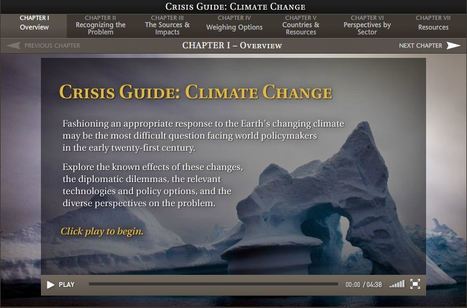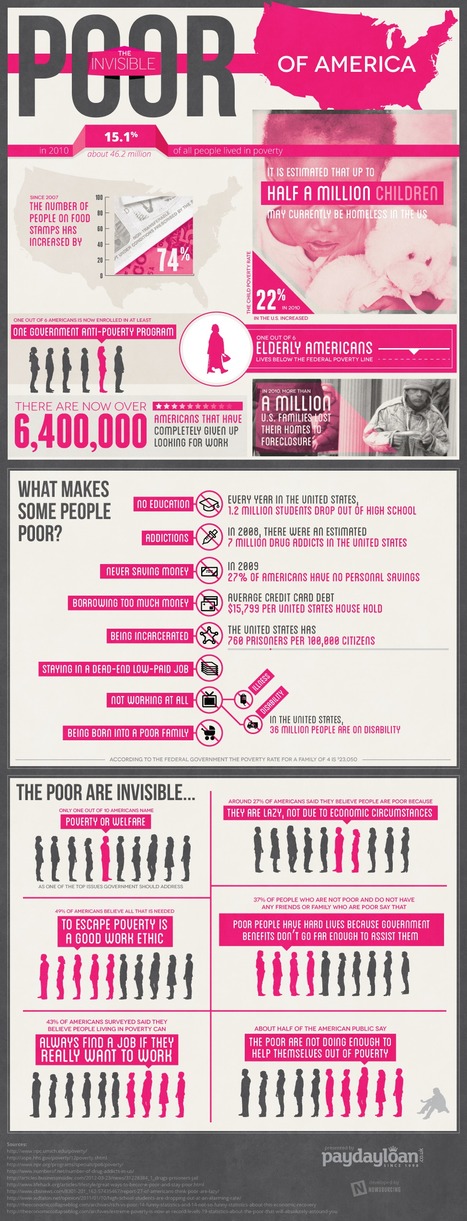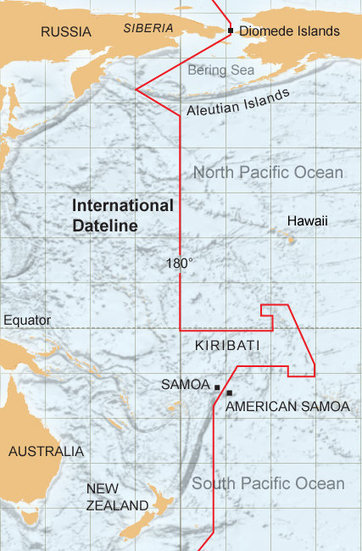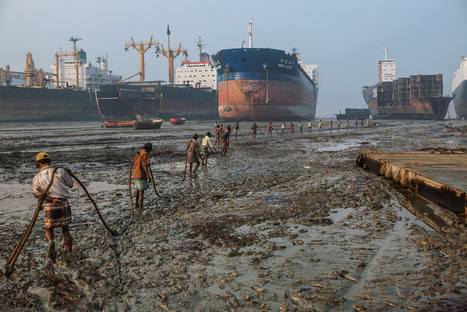NASA's animation of China's Three Gorges Dam construction over the years.
Get Started for FREE
Sign up with Facebook Sign up with X
I don't have a Facebook or a X account
 Your new post is loading... Your new post is loading...
 Your new post is loading... Your new post is loading...

Paige Therien's curator insight,
February 22, 2014 4:01 PM
This controversial pipeline project would allow the transportation of crude oil from Alberta, Canada's Athabasca Oil Sands to the United State's Gulf Cost. This proves to be a difficult feat. Extracting oil from this source is very difficult since it is also mixed with clay and sand, making it very dirty. Transportation of this dirty substance through the pipeline would be equally as hard and risky since there is a risk that the oil could corrode the pipe. This poses severe environmental and safety risks. This pipeline passes through an international border and seven U.S. states which play huge roles in feeding the country. A pipeline passing through this area could easily pollute the Mississippi River Basin, which is the main water source for the people and the crops located in the central area of the country. There have also been cases where corroded pipelines have allowed widespread fires to occur, which is a possibility here. Extracting oil from this source would allow North America to be self-reliant, however, there are many drawbacks to creating such a huge pipeline which originates in such dirty oil sources.
Jacob Crowell's curator insight,
October 15, 2014 12:57 PM
The three main arguments against Keystone XL is, one; making liquid fuel from tar sands keeps the United States dependent on a very polluting source of energy. Instead of moving towards cleaner sources of energy, the US would continue being one of the highest in CO2 in emissions. Secondly; the pipeline has risks that include spills because the tar sands oil could corrode the pipe line and leak. And thirdly, the oil from keystone could be sold to foreign markets instead of staying domestic. Although the US needs to start being less dependent on foreign oil the Keystone pipeline is not the way to do so. Oil itself is not a permanent solution, it will run out and it continues to harm the environment. This pipeline defiantly poses more risks than anyone should be comfortable with.
Raymond Dolloff's curator insight,
November 23, 2015 2:43 PM
The Keystone Pipeline is a pipeline bringing natural gas from Canada into the States. Many politicians are against the XL project to connect the pipeline from the Tar Sands in Alberta to the Gulf Coast. However, there has been much rebuff from the Democrats within the Congress and the White House.

Ivan Koh's curator insight,
February 3, 2013 7:37 AM
This is my insight using See-Think-Wonder.
Brandon Lee's curator insight,
February 4, 2013 10:36 AM
The insight of this article merely showed that more and more people does not really have a good financial health, which also has translated into people wer e "invisible poor" especially those living in the western world. Comparison had been made on its poverty line between USA and UK statistics. In my opinion, managing a country's budget its not an easy task, this is because a country need competitive global presence and to boost the economy. People need to produce more and more services outside its own country. I have often thought that a country's population does have an impact on a country's economic growth. 
Tim Stark's curator insight,
October 24, 2015 9:54 PM
Great visual for economics and sociology courses

Edgar Manasseh Jr.'s curator insight,
May 1, 2015 8:06 PM
500 birthdays were taken away due to an international date line. In Samoa is in a confused state between the united states and the Asian pacific side of the timeline which would cause time and dates to be confusing.Dynamic economic networks and political allegiances have created a very difficult situation for the people near the border in Samoa. The International Date line in Samoa is something that is needed to be watched and paid attention because it can affect people in ways that can be very significant even at a small tiny rate.
brielle blais's curator insight,
April 26, 2018 1:33 PM
This post shows the importance of trade to each country, so much so that Samoa was able to get the International Dateline changed to accommodate their trade needs, skipping a day and allowing easier economic networks with China and Australia, who are important trading partners.
Stevie-Rae Wood's curator insight,
December 9, 2018 11:11 PM
The International date line is a tricky situation, initially more thought should have been put into it considering it is just a straight line right down the middle of some islands. One could be next door neighbors with someone who's calendar day is Saturday while they are already are on Sunday. Talk about jet lag.
|

Sarah Cannon's curator insight,
December 14, 2015 9:58 AM
Besides that scrap metal pollutes water and rivers, this is a health risk for humans too. I also know someone who worked at Electric Boat at the Air Base in North Kingstown who's health was also affected due to metal scraps and particles in the air. Years later after working at EB he developed lung cancer. Metal erodes away as well, especially when left sitting in salt water.
Benjamin Jackson's curator insight,
December 14, 2015 11:54 AM
this is both amazing and horrifying in what these people do on a daily basis. i cannot imagine doing what these guys do everyday, and i never imagined how taking apart one of these ships would work.
BrianCaldwell7's curator insight,
April 5, 2016 8:16 AM
What happens to massive cargo vessels after they are outdated? There are tons of scrap metal, but they aren't designed to be taken apart. The ship-breakers of South Asia (Bangladesh, India and Pakistan are 3 of the 4 global leaders in recycling ships) risk much to mine this resource. This is an economic function that is a part of a globalized economy, but one than was never intended. There are major health risks to the workers and pollutants to the local community that are endemic in this industry that manages to survive on the scraps of the global economy. Tags: Bangladesh, South Asia, poverty, development, economic, globalization, industry, labor.
Anthony morales's curator insight,
October 28, 2014 12:39 PM
korea wants to start a war but are bluffing because they are leaving one of there main nueclar factories open and not closed off This is a part of PERSIA by this ties in with economy by how Kim Jong lil has to decide what happens in this country 
AnthonyAcosta/NoahMata's curator insight,
November 5, 2014 1:32 PM
North Korea War
The North Korean leader is showing that he is pro war but the actions that he is taking lead us to believe that he is "All Talk". Does he really feel that war is the best option at this point or does he just want to seem like he is the best.
brielle blais's curator insight,
May 2, 2018 10:57 AM
This article showcases the importance of positive relations between countries and how it impacts the political geography. In this case, it is between North Korea and South Korea. North Korea has sent signals of starting a war for a long time now, so many times that people can now call its bluff. It is mostly because of the Kaesong Industrial Complex that employs both North and South Koreans. It is an incentive for both countries to remain friendly, if not, at least civil.
Altaira Wallquist's curator insight,
March 18, 2015 4:47 PM
This article goes in depth to define and describe globalization. It discusses globalization through an economical, political, and cultural standpoint.
This connects to Unit 1 in that it discusses globalization and things from a global perspective. It all discusses the society we live in today. |


















The impact of the Three Gorges Dam on the residents upstream is amazing. I cannot imagine anything like this happening in the US, mostly because of the impact on the people both upstream and downstream. Ecological damage from this dam may not phase the Chinese government, but I think any North American or European government would shudder at the thought of the backlash among their citizens this would create.
Three Gorges damn in China is the largest dam ever constructed. This was created to save on power by creating hydroelectric power for the people of the land. One of the issues with this was the the flooding of the land up streams displacing millions of people. It created a larger up stream area and very small down stream. A lot of the people that lived up stream had to be relocated further inland and faced changing climatif weather. The banks of the river are carved out between what seems like mountainous regions so as you move more uphill the weather and temperature will be a whole new category of life (Depending on how far you relocated).